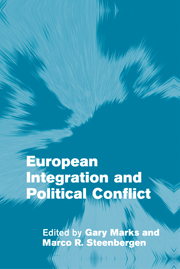Preface
Published online by Cambridge University Press: 22 September 2009
Summary
This book grew out of three workshops held at the University of North Carolina Center for European Studies between October 1998 and May 2000 organized by Gary Marks, Marco Steenbergen, David Scott, and Carole J. Wilson. By the late 1990s the notion that the European Union was part of an overarching, multilayered polity was commonplace, as was the conviction that comparative politics provided a powerful set of tools for analyzing that polity. Scholars of social movements, interest groups, political parties, mass publics, legislatures, elites, and bureaucracies were drawn to the study of the European Union both to encompass it within existing theories and to refine those theories.
This is the intellectual background to our project. Our goal was to bring together comparativists who could shed light on the underlying structure of conflict in the European Union and who could relate this to the conflicts that shaped politics within European countries. The project draws on two scholarly traditions: the analysis of cleavages and dimensions of contestation that stems from the work of Stein Rokkan and Seymour Martin Lipset, and the analysis of political conflict in the European Union that originated in the writings of Ernst Haas and Philippe Schmitter.
At the time we were formulating this project we had the sense that we were engaging fundamentally new questions, or combining old questions in novel ways. The dimensionality of European integration and its connection to domestic contestation is indeed a relatively new topic.
- Type
- Chapter
- Information
- European Integration and Political Conflict , pp. xiii - xivPublisher: Cambridge University PressPrint publication year: 2004

